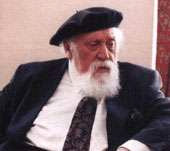About
In our fast changing technological world we can’t predict what content our pupils will have to deal with in 20 years time. However we know for certain that they will have to be flexible adaptable thinkers and learners in the 21st century.
Professor Reuven Feuerstein’s theory of Structural Cognitive Modifiability and its applied systems demonstrate how the learning and adaptability of each individual may be significantly improved by producing structural changes in the brain; making the learner more modifiable - more able to learn and to benefit from direct exposure to the environment and to new experiences.
Professor Reuven Feuerstein is recognised by key academics worldwide as the world’s greatest educator of our generation. Feuerstein’s theory and methodology offer a visionary way forward to address many of the current agenda issues in Scotland today:
“Better Behaviour, Better Learning”, “Children in Care”, “ Early Intervention & Family Support”, “ Life-Long Learning” and “Anti-Social Behaviour”
Feuerstein’s theory and methodology is essential in order to achieve the National Priorities in Education: improving learning and teaching; raising motivation and achievement; promoting inclusion and equality; improving behaviour and discipline; working with parents and carers to equip pupils with the pre-requisite skills for formal, social and life-long learning.
"I found the Feuerstein philosophy fascinating and inspiring.
All of my working life I have been striving to enhance the lives of those
who have potential but find themselves being let down by the 'system'."
Feuerstein developed a system of education, which took children and adults with learning, psychological, behavioural and medical problems and transformed them emotionally and intellectually so that they could be successfully integrated into education and society. Feuerstein’s theory - from which millions of children have benefited, currently backed by over 1500 research studies worldwide; states that learning ability can be significantly enhanced, regardless of age, nature, cause or severity of condition.
At a time when the knowledge we are transmitting at school may only be of limited value to our pupils 20 years from now, when schools seem to be overwhelmed by troubled and vulnerable children and communities are challenged by anti-social behaviour; Feuerstein’s curriculum and methodology for teaching children, young people and adults to “learn how to learn and think” is an urgently needed innovation.
The Instrumental Enrichment programme (IE) is a curriculum in thinking, which is designed to enhance cognitive functioning, and is based on Feuerstein’s theory of Structural Cognitive modifiability and a philosophy that all children, adolescents and adults can learn and change their level of functioning.
"
Never before have I seen such an exciting principle or system
that can make such a profound and lasting impact on the lives
of those
whom the education system is currently failing."
The goal of the IE programme is the development, refinement, and crystallisation of thinking processes that are needed for effective thinking, problem solving, and decision making. It focuses on transforming passive and dependent learners into more active self-motivated students.
For students who have previously experienced failure in school, IE creates opportunities to gain insights into their way of thinking, attitudes, and feelings. They can begin to appreciate that the source of their difficulties is not due to their inferiority, inability, or lack of intelligence, but is due to inefficient strategies or lack of thorough planning.
They can see that these changes are within their control, and when they think things through and examine what caused the failure, in most cases it can be corrected. Gradually they learn to take more risks, and they begin to seek challenges in their learning.


